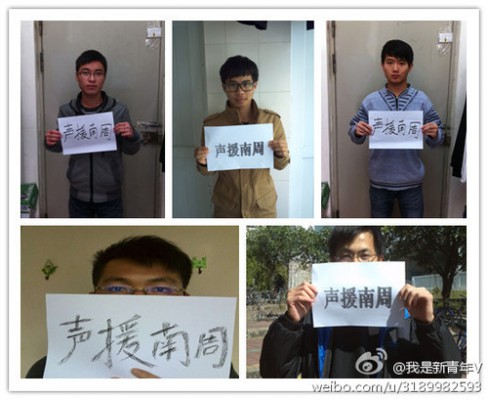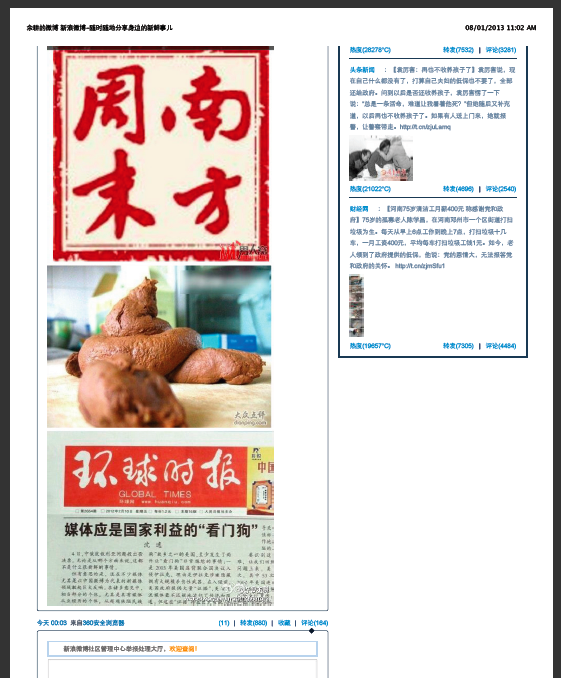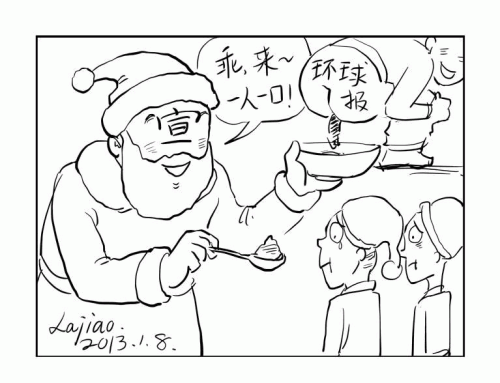The Southern Weekly story continues to develop rapidly in China. With no response yet from the Party leadership, the stakes are rising. How will China’s leaders balance the impact this crisis could have on Xi Jinping’s (not-so-carefully crafted) image as a reformer against the Party’s essential priority of maintaining public opinion controls?
If it is true, as Berkeley’s China Digital Times (CDT) reports, that media have been issued a propaganda directive on the Southern Weekly incident that deflects blame from Guangdong propaganda officials toward foreign “hostile forces,” that is not an encouraging sign. The tone of the directive as reported by CDT is extremely hardline, reaffirming that “Party operation of the media is an unshakeable basic principle (党管媒体是不可动摇的基本原则).”
As the Southern Weekly crisis develops, we should bear in mind that this did not begin as a face-off between pro-reform voices and status-quo Party conservatives. While the incident has now prompted calls for freedom of speech in China, the root issue was that propaganda officials in Guangdong — the spiritual heart of China’s reform and opening — upset the status-quo by exercising censorship to such an intrusive extent that the situation became unacceptable to working journalists, most of whom had already made an uneasy peace with media controls.
The crisis at the Nanfang Media Group is not just about whether Xi Jinping is serious about the ostensible new openness and responsiveness attributed to him by sustained state propaganda. It is about whether China could be moving backward on the issue of media freedom, which would send worrying signals about the overall direction set by the new leadership.
Despite the concerted application of controls on Chinese social media — more from our excellent Data Journalism Lab — the Southern Weekly incident seems not to have abated online.

[ABOVE: In these images posted to Chinese social media, users hold up signs supporting Southern Weekly.]
In particular today, social media users have heaped scorn on the Global Times newspaper for its editorial yesterday, which played down vocal opposition to the actions against Southern Weekly by suggesting its defenders were an isolated few with little real knowledge of what had actually happened at the paper.
The Global Times editorial — which was run in scores of Chinese media under an order by propaganda authorities — alleges on the basis of a statement issued on January 6 through the official Sina Weibo account of Southern Weekly that Guangdong’s provincial propaganda office was not responsible for the changes made to the paper’s New Year’s edition after the page proofs had been finalized by editors. As we wrote yesterday, reliable internal sources at Nanfang Media said editors and other staff widely criticized that Weibo statement, which was in fact pushed by propaganda authorities exerting pressure on the paper’s top editors.
Here is one of the paragraphs in the Global Times piece, which also makes a snide reference to the case of Chen Guangcheng, apparently an attempt to brand Southern Weekly supporters as collaborators aligned with American interests, an assertion that fits with the “hostile forces” warning in CDT’s reported propaganda directive:
The Southern Weekly crisis has smoldered in recent days, but if we look carefully we see that many of the people most active online, aside from a few who are working at Southern Weekly, are those who left Southern Weekly long ago, people who have lately had not relationship to the newspaper group — and also a number of active Weibo users. In the real world, they are quite scattered, connecting only through the internet. Their most recent focus of support [before this incident] was Chen Guangcheng (陈光诚), who is now far away in America.
The Global Times piece also confuses the issues at stake in the Southern Weekly incident, suggesting the protests represent an impractical, idealistic push for free media:
Whether or not these people wish it to be so, there is a generally accepted view that under China’s current social and political situation it’s impossible to have “free media” of the sort these people desire in their hearts. The development of all media in China can only accord with China’s larger realities. Media reform must be part of China’s overall reforms, and media will assuredly not become “political special zones” in China.
No one, of course, is calling for “political special zones” in China. As I said earlier, journalists at Southern Weekly were objecting first and foremost to a serious encroachment on already limited freedoms. Arguably, there was ample opportunity late last week, after the incident broke, for the authorities to deal with it intelligently. It was only after the strong-arm response over the weekend — and the forced false statement through the newspapers official Sina Weibo account — that the situation escalated into broader calls for free speech.
In a clear indication of the ugly turn in the tone of the row over the Southern Weekly incident, social media users are widely likening propaganda and media censorship to the feeding and eating of feces.
This post by Yu Geng (余耕), for example, jokes bitterly that “in fact only a piece of shit separates Southern Weekly and the Global Times — of course, Southern Weekly shovels the shit and the Global Times eats it.” The post is accompanied by a smash-up image of both newspapers separated by, well, see for yourself.

The image of Global Times in the smash-up is taken from the newspaper’s February 10, 2012, edition, which features an article by a Fudan University scholar arguing that Chinese media must act as watchdogs, but of the country’s “national interests” rather than the public interest.
This Weibo post, with another visual mash-up, similarly likens the Global Times to a “good dog” that does the bidding of Party leaders.
In this cartoon, posted to Sina Weibo by artist Perverted Pepper (变态辣椒), a Santa Claus whose face is formed by the Chinese character for “propaganda” (宣) spoon feeds feces to waiting children from a bowl being used as a toilet (to put it gently) by another figure labeled “Global Times: “One spoon for each person!” he says.

When Global Times editor-in-chief Hu Xijin (胡锡进) defended his newspaper earlier today by saying it had “a responsibility first and foremost to its millions of readers,” he was met with a tide of scorn. One user re-posted Hu’s remarks and added: “What editor-in-chief Hu means to say is that when shit tastes this delicious, why aren’t the rest of you following our example?”






















